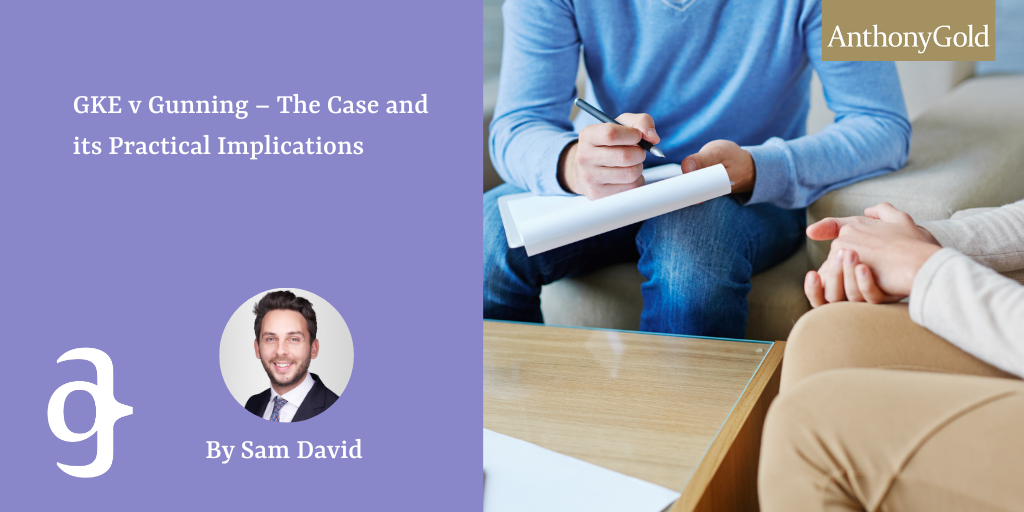GKE v Gunning – The Case and its Practical Implications

The case concerns an action alleging abuse of trust between a client (the Claimant) and her counsellor/coach (the Defendant). Between 03 August 2016 and April 2018, the Claimant attended counselling sessions and therapy with the Defendant funded initially by her employer and then from April 2018 on a private basis.
In April 2018, the claimant arranged and attended three counselling sessions with the Defendant which she paid for privately. The Claimant attended the sessions to work on her self-esteem, become more fit and healthy and improve her mental health overall, as the sessions progressed, to explore issues around psycho-sexual problems she was having and suggest possible treatment.
The Claimant alleged that, on or around October 2017, the Defendant had started to send inappropriate messages to the Claimant and to contact her out of hours, often very late at night. The Claimant claimed that the Defendant’s contacts were sexually suggestive and caused her anxiety thereby negatively impacting her mental health.
By February 2018, it was asserted that the Defendant had begun started adding “x” to his text messages. The Claimant asserted that she became increasingly concerned at the Defendant’s inappropriate conduct during and in between sessions. The Claimant claimed that the Defendant’s conduct had caused her psychiatric injury and she instructed psychiatrist Dr de Taranto to provide causation and condition and prognosis evidence on the same.
The Defendant denied any breach of duty. He stated that his communications with the Claimant were reflective of recognised practices used by sexual therapists. He alleged that he added an “x” to messages because the Claimant began doing so herself. The Defendant was a litigant in person and did not call any experts.
Practical implications of this case
This case is a helpful reference for future matters that may contain a personal injury claim for Intentionally causing Harm by Words (IHW). Practitioners should heed the narrow application of IHW in this case.
The judge found that recklessness was not enough to found IHW – it was intention that was required. The judge suggested that in limited cases it may be possible to infer intention from actions where it was extremely obvious, they would lead to harm (e.g. the statement “I am going to kill you”), but he found the facts in this case fell short of that.
However, the judge did comment that this was a case where negligence already covered the Claimant’s need for compensation, suggesting that he may have approached the law differently had that not been the case.
This case is also a reminder to take great care when choosing which liability experts to instruct. The judge approached the case like a clinical negligence case, assessing breach of duty from a Bolam basis.
The Claimant instructed a neuropsychologist as her liability expert. The judge described the difference in expertise between the neuropsychologist’s expertise, and that of the Defendant (who was a counsellor), as a “fundamental gap” in the Claimant’s case that required him to treat the expert’s evidence with “the greatest of care” and as such was of limited assistance to the Court.
Furthermore, practitioners dealing with vulnerable clients/witnesses should note the judge’s criticisms of an order made to protect a vulnerable witness.
Under the terms of the same, the Defendant was required to file and serve a list of cross-examination questions a week before trial. These were shared with the Claimant, and (potentially) discussed with the Claimant and her solicitors. The judge held that the order should not have been construed as one where the claimant herself was allowed to see the questions and discuss them with her legal team.
The judge found this was unjustified and created an unlevel playing field between the parties. Practitioners representing both claimants and defendants should take care when drafting vulnerable witness orders to ensure they do not have the potential to undermine the fairness of a trial.
The Judgment
Mr Justice Ritchie criticised both the Claimant and the Defendant as witnesses. He found that the Claimant’s evidence was manipulative and inconsistent. He noted that the Claimant’s communications with the Defendant had started in August 2016 (over a year earlier than she alleged) and that much of the communications (including the use of “x”s to end messages) were instigated by the Claimant.
The judge found that the Defendant was also manipulative in his use of the facts, and that he was doing so in order to avoid his duty of care. For example, he refused to accept that the Claimant was his patient or client for the purposes of receiving coaching or counselling for 18 months.
Mr Justice Ritchie did not find that the Defendant had breached his duty of care towards the Claimant at any time before the third therapy session in April 2018. The judge was at pains to emphasise that he lacked the proper expert evidence (which would have come from a counsellor and/or sexual therapist) to properly assess whether the Defendant’s practices before April 2018 were acceptable within his field.
However, the judge found that the Defendant did breach his duty of care in asking the Claimant in the third therapy session in April 2018: (1) to undress in the last private counselling session and (2) to masturbate in front of the Defendant and/or at home whilst recording herself, and that those actions would give rise to a foreseeable risk of personal injury.
Mr Justice Ritchie did not find that the Defendant had committed the tort of IHW. The judge found that throughout most of the counselling the Defendant genuinely believed he was trying to help the Claimant, but that during the third therapy session in April 2018 his own sexual desires took over.
However, at no time did the judge consider that the Defendant intended to harm the Claimant. On that basis, the judge did not award damages or aggravated damages for IHW. Mr Justice Ritchie commented that aggravated damages should be considered as a type of compensatory damages, rather than punitive damages, but that in any event, the necessary element of intention was lacking for him to make such an award.
* Disclaimer: The information on the Anthony Gold website is for general information only and reflects the position at the date of publication. It does not constitute legal advice and should not be treated as such. It is provided without any representations or warranties, express or implied.*

No comments